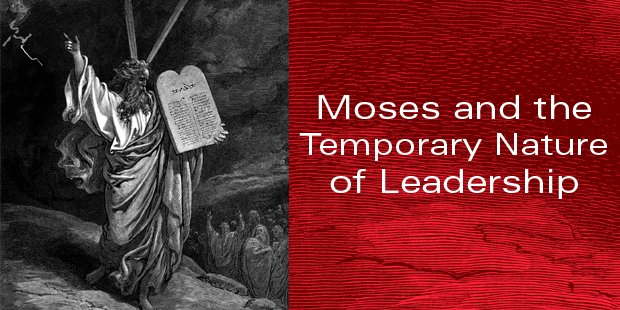
Moses and the Temporary Nature of Leadership
Leadership is always a temporary assignment—always. It is a temporary assignment because leaders do not ultimately own the teams, ministries, or organizations that they lead. They simply steward what the Lord has entrusted to their care for a season. Wise leaders embrace the temporal reality of leading, and they prepare the ministry for the future. Because the assignment is fleeting, developing others for leadership is an essential responsibility of a leader.
Moses understood the temporary nature of leadership and the necessity of succession. He personally selected and invested in leaders. He modeled leadership by replicating leaders.
This pattern of divesting and replicating leadership began not long after the exodus from Egypt. Moses led a group of millions literally by himself. At one point in his ministry, Jethro, Moses’ father-in-law, arrived for a visit and asked, “What is this you are doing for the people? Why do you alone sit as judge, while all these people stand around you from morning till evening?” (Ex.18:14). Moses tried to explain his role as arbiter of millions, but his answers fell short. Jethro, always quick to correct, said, “What you are doing is not good. You and these people who come to you will only wear yourselves out. The work is too heavy for you; you cannot handle it alone” (Ex.18:17-18).
Jethro encouraged Moses to select honorable, wise, and godly men who could be taught basic interpretation of God’s laws and instruction. It was a defined leadership system designed not only to alleviate stress immediately from Moses but also to sustain the young nation for the long haul. Ultimately Moses listened to Jethro, leaders emerged, his stress lessened, and his father-in-law went home.
This pattern of multiplication in Moses’ life and leadership reached its pinnacle with his selection of Joshua as his successor.
Joshua is first mentioned in the Scripture when Moses chose him to lead the Israelite army in battle against the Amalekites (Ex. 17:8-16). From that moment forward, we observe Moses intentionally developing Joshua.
As you read through the Scripture, you see Moses pouring into Joshua. Moses brought Joshua up the mountain to receive the Ten Commandments from God (Ex. 24:13). Joshua observed Moses’ righteous indignation when Moses smashed the two tablets (Ex. 32:17-19), and Joshua was witness to the holy communion Moses shared with the Lord as he guarded the tent of meeting (Ex. 33:11).
Through all these critical moments in the life of God’s people, Joshua was there with Moses. Moses helped ensure the following generation would love and fear God. He served his people by pouring his life into another. And immediately after Moses’ death, Joshua was ready to lead Israel.
Moses’ behavior is a model for modern-day leadership. We can see the priority he placed on the future by how he empowered younger leaders like Joshua. Simply put, leaders are responsible for future leadership.
A leader who is not developing future leaders is not serving the organization well. The leader is either being shortsighted or selfish—shortsighted in that the future is not being considered or selfish in that the leader thinks only about himself/herself.
The leadership legacy of Joshua, sadly, is very different, as we find in the Book of Judges. After Joshua’s death, Israel drifted from the Lord and lived in chaos:
“Joshua son of Nun, the servant of the Lord, died at the age of 110…That whole generation was also gathered to their ancestors. After them another generation rose up who did not know the Lord or the works He had done for Israel” (Judges 2:8,10, HCSB).
Why the stark contrast?
There is no record of Joshua investing in anyone. We don’t see him intentionally developing leaders. We don’t read of him pouring into others. And the generation after his leadership didn’t know the Lord.
A soul-searching question: If you were to hand your temporary leadership assignments over today, would a statement about your leadership sound more like Moses or more like Joshua?
Moses proactively and intentionally invested his life in Joshua. Under Joshua’s leadership, Israel enjoyed great prosperity and victory. But Joshua failed to see the value of investing in younger leaders.
Will you be like Moses or like Joshua? Will you invest in others who will ensure the following generations know of the Lord and His gracious works?

Tags: Eric Geiger, Joshua, Leadership Development, Moses, temporary leadership












